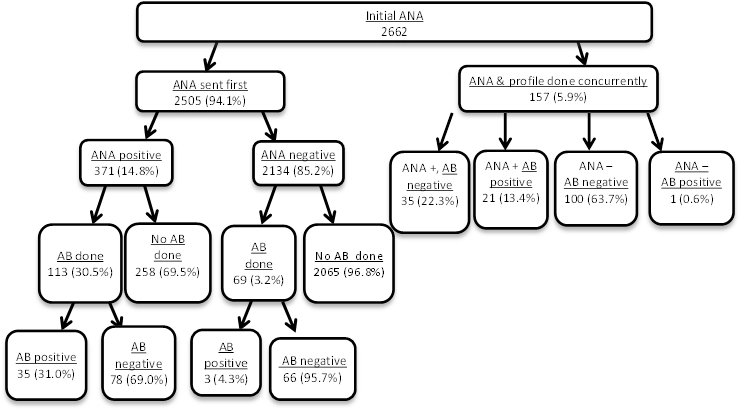Session Information
Session Type: Abstract Submissions (ACR)
Applying Choosing Wisely®: Identifying Inefficiencies of ANA (antinuclear antibody) Subserology Testing in a Safety Net Health System
Background/Purpose: In 2013, the American College of Rheumatology participated in the American Board of Internal Medicine Foundation’s Choosing Wisely® campaign, developing a Top 5 List of things physicians and patients should question. Among the top 5 items in rheumatology was “do not test ANA (antinuclear antibody) sub-serologies without a positive ANA and clinical suspicion of immune mediated disease.” The goal of this study was to analyze ANA and sub-serology ordering patterns in a large safety net hospital, and to identify areas where there may be room for value improvement.
Methods: We identified all ANA and sub-serology testing and results at Denver Health, a large safety net hospital, between 1/1/2005 and 12/31/2011 via query of the electronic medical records. We included the following antibodies among the sub-serology testing: Ro (SSA), La (SSB), double stranded DNA, centromere, ribonuclear protein, Smith, Scl-70 and Jo-1. Finally, we identified the timing of the ANA and the sub-serologies, and using logistic regression, we identified predictors of the ANA and profile being sent simultaneously. Variables for logistic regression included demographics, insurance type and if the laboratory was sent by primary or specialty care.
Results: During the seven years, a total of 2800 ANA tests were ordered, of which 9.7% had multiple ANAs. Thus we analyzed 2662 index ANA studies. Of those patients with both an ANA and at least one sub-serology ordered at any time (n=339,) 46.7% (n=157) had these laboratory tests sent at the same patient encounter. A subspecialty care appointment predicted that the ANA and sub-serologies were sent concurrently (OR 8.41, 95% CI 5.46-12.96, p-value <0.0001). Only 4 individuals (1.5%) were found to have at least one positive sub-serology in the setting of a negative index ANA (see Figure).
Conclusion: In this study, we showed that of the 2662 index ANAs, approximately 6% (157) of tests were accompanied by sub-serologies at the same patient encounter. A negative ANA predicted negative sub-serologies with rare exception in these patients. This brings into question the value of sending an ANA and sub-serologies simultaneously, which may not be cost effective or clinically indicated, and demonstrates an area for value improvement in rheumatology.
Figure: ANA and sub-serology ordering patterns between 2005-2011 at Denver Health (AB: at least one of the following was ordered: SSA, SSB, Smith, Centromere, Ribonuclear protein, Double stranded DNA, Jo-1 and Scl-70)

Disclosure:
L. A. Davis,
None;
B. L. Goldstein,
None;
V. Tran,
None;
A. Keniston,
None;
J. Yazdany,
None;
J. M. Hirsh,
None;
A. Storfa,
None;
J. Zell,
None.
« Back to 2013 ACR/ARHP Annual Meeting
ACR Meeting Abstracts - https://acrabstracts.org/abstract/applying-choosing-wisely-identifying-inefficiencies-of-antinuclear-antibody-subserology-testing-in-a-safety-net-health-system/
